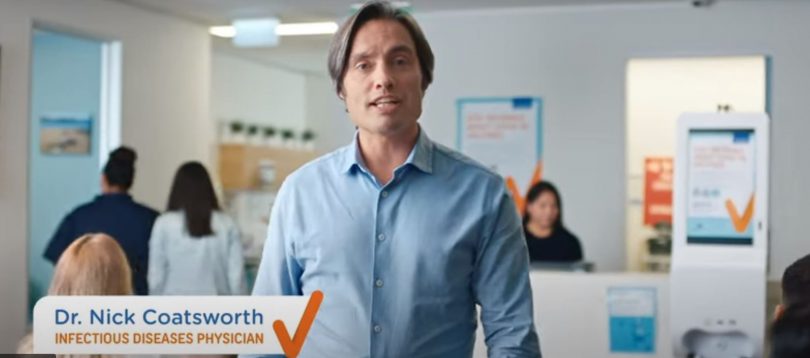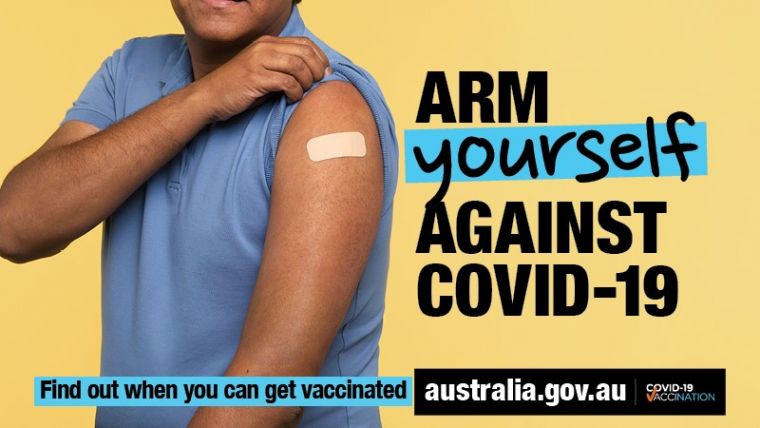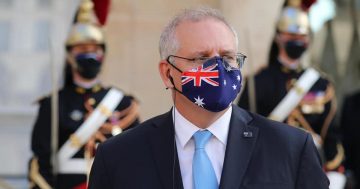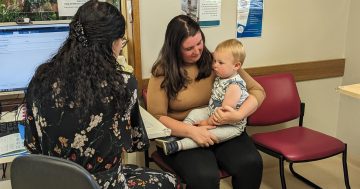
Dr Nick Coatsworth’s ad has been superseded by the Commonwealth’s controversial new campaign. Photo: Screenshot.
A COVID-19 public health campaign spearheaded by Canberra Hospital’s Dr Nick Coatsworth has been superseded by a new advertising blitz, urging Australians to get the jab.
But one marketing expert has raised concerns that the new Arm Yourself campaign – which urges Australians to “arm yourself”, “your family”, “your friends”, “your workmates”, “your community” – is sending the wrong message, failing to address the issues around vaccine availability and appointments.
The ad’s launch follows concerns from public health experts that the existing community messaging was lacklustre. The Arm Yourself campaign will be released on social media, billboards, television, print and radio, and aims to encourage more people to get vaccinated.
“A COVID-19 vaccine is your best defence and our only way forward,” is the central message.
The head of the Commonwealth’s vaccine task force, Lieutenant General John Frewen, said the campaign would be adapted over time and translated to reach non-English speakers.
My Public Sector
“The Arm Yourself campaign seeks to rally Australians to both arm themselves and to arm their friends, loved ones and communities against COVID-19 through vaccination,” he said.
“The materials will be adapted for culturally diverse groups and for Indigenous communities and they will be translated into many languages, and we will continue to adapt the products as we go through the rollout through this year.”

Andrew Hughes said the campaign was “one of the worst messaging failures in our public health history”. Image: Department of Health.
But Andrew Hughes from the School of Business and Economics at the ANU says the Arm Yourself campaign has missed its mark, failing to address the reality that people are highly motivated about vaccination but confused about what category they fit into, which vaccine to get and where they can access the jab.
“I’ve never seen a situation where people were more urgently demanding clear information, and it was less available from the government,” he told Region Media, describing the information campaign around COVID as “one of the worst messaging failures in our public health history”.
Dr Hughes says the public health messages need to be clear and consistent, not too complicated or wordy and with a clear motivation for behavioural change.
“The campaigns should have targeted people whose behaviour needs to change, the ones who don’t want to get a vaccine at all, people who think they’re bulletproof,” he says.
“And in fairness to ordinary Australians, many of them don’t know where or how they will get the vaccine.”
He’s critical of earlier ads, which he says failed to engage the public, creating a risk that people would stop paying attention.
He agrees that the Sydney-specific ad, depicting a young woman suffering serious effects from COVID-19, was more effective.
Chief Medical Officer Paul Kelly has said the more graphic 30-second spot is intended to shock the locked-down population of Sydney into action.
But Dr Hughes says the government needs to engage in heavy lifting, explaining its objectives simply and clearly.
“People are crying out for information. That’s why they are going to Norman Swan. It’s not that the ads themselves aren’t working. Without clear messaging, the whole campaign is not working.”
And, Dr Hughes says, there’s a clear political risk here too.
“The government is running out of time before next election,” he says.
“They wanted to tell the electorate a story about economic recovery and low unemployment, but that story will be lost because of this failure in the one area where it should be governing correctly.
“Had they got it right by now, we’d be talking about what a good job they’d done.”
For more information on vaccinations, visit ACT Health or Service NSW.
















